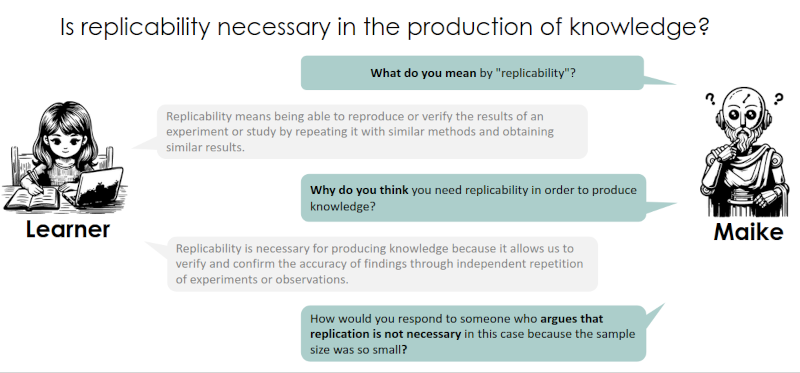Maike: a Socratic Chatbot
The challenge
Students are increasingly exposed to AI tools that offer instant answers and polished outputs, encouraging passive consumption rather than active engagement. Such dependency can lead to cognitive atrophy, reduced agency, compromised academic integrity, diminished self-efficacy, and normalized surveillance and privacy violations. If we aim to cultivate critical thinkers, we must critically evaluate the tools we use—and how we use them.
Our response: Maike, a Socratic chatbot
In response to these challenges, we are developing Maike, a Socratic chatbot designed to support—not supplant—student thinking. Unlike traditional chatbots that provide quick answers, Maike is guided by pedagogical principles that emphasize inquiry over instruction, dialogue over delivery. Drawing from the tradition of Socratic questioning, Maike prompts learners to reflect, articulate, and revise their reasoning through meaningful conversation.
The chatbot is designed to foster critical thinking, self-regulated learning, and a more profound sense of agency. By asking the right questions rather than offering immediate solutions, Maike encourages students to engage deeply with complex ideas, enhancing both their cognitive and metacognitive skills. Our goal is to design an AI-powered learning companion that empowers rather than diminishes the learner.
Planned user study
To empirically evaluate Maike’s educational impact, we are planning a study with students enrolled in the International Baccalaureate: Theory of Knowledge course—a curriculum known for its emphasis on critical thinking and epistemological inquiry.
- Objective: To assess whether interactions with Maike improve students’ reasoning and critical thinking skills.
- Methodology: The study will be conducted remotely using digital tools and does not require laboratory participation.
- Design: Participants will be divided into three groups: a control group, a group using a generic chatbot, and a group using Maike. Their critical thinking abilities will be measured before and after the intervention using validated assessments.
- Timeline: The study is scheduled to take place at the end of 2025.

Looking ahead
Maike represents an interdisciplinary effort to align educational AI with core pedagogical values. Rather than letting technology shape learning in unchecked ways, we propose a reflective and transparent approach—one that prioritizes the development of independent thinkers in a digital age. If we are to trust AI in the classroom, it must first earn that trust by supporting the learner’s growth, not replacing it.
More about Maike
Talk: Towards Student-Centric AI-Supported Learning: Teaching Chatbots to Ask the Right Questions
Our scientific publications
2025
Vienna, AT
Palermo, IT
Philadelphia, US
2024
Santiago de Compostela, ES